Overview
| Price: | Well Priced |
| Subscription Fees: | No fees |
| Setup: | Networking knowledge and support are available. |
| Resolution: | 1080p 2MP |
| Dimensions: | 266.6mm wide x 437mm high |
| Darkfighter X Specifications: | Dual CMOS sensors – one for colour and one for B/W |
| Key Characteristics: | Long range, low light, awesome sharpness, affordable. |
Hikvision Darkfighter X PTZ Super Features Camera
Contents
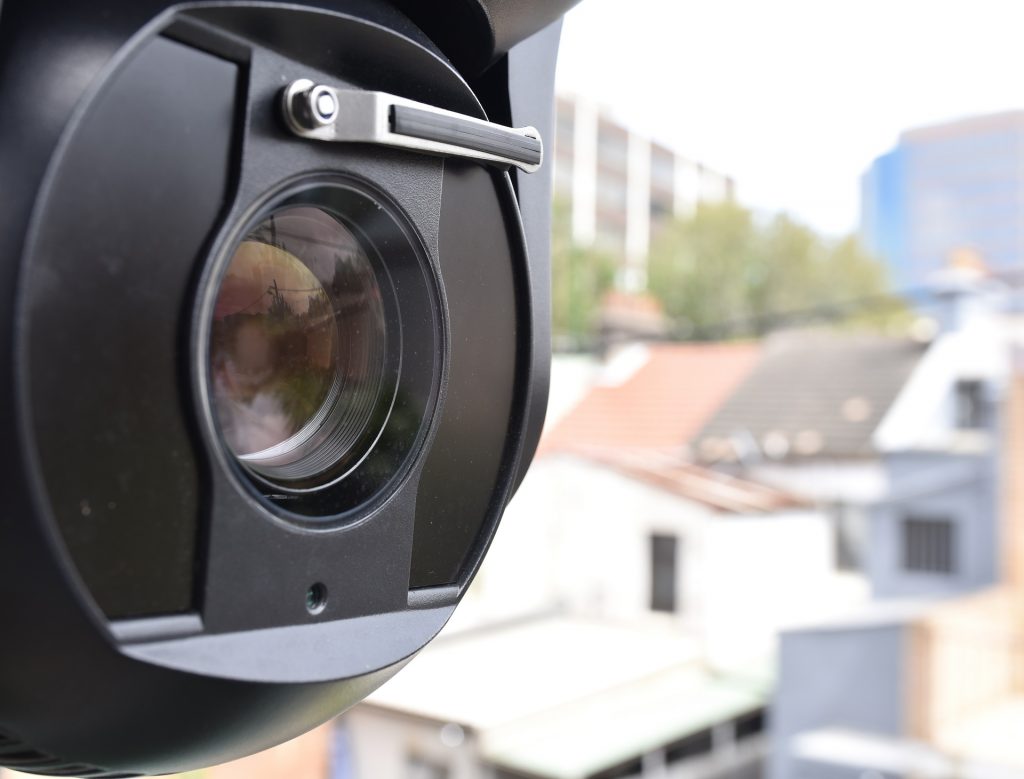
Hikvision Darkfighter X PTZ is a powerful IP66-rated PTZ camera designed specifically for strength in low light applications at close and long ranges. Its key feature is a 2-sensor design, one sensor for colour and another monochrome.
When I pull the Hikvision Darkfighter X PTZ out of its crate and install it on a heavy-duty dome camera pendant tripod, my first impressions are of its size and heft – this is a robust PTZ camera designed for serious work in external environments. The Hikvision Darkfighter X PTZ camera is constructed of aluminium alloy with some PVC components and has dimensions of 266.6mm wide x 437mm high with a weight of around 8kg. It’s designed for pendant mounting and while it can look above the horizon, it’s not able to look directly upwards as some base-mount PTZ units we’ve tested can.
Hikvision Darkfighter X PTZ Super Features
Features of Hikvision Darkfighter X PTZ include 1080p 2MP resolution, day/night function with IR cut filter, ½.8-inch dual optical and IR CMOS sensors, integrated 200m IR array, 25x varifocal zoom lens with F1.5-F3.5 4.8-120mm range with autofocus, 16x digital zoom, -20 degrees to 90 degrees of tilt (Auto Flip), 120dB wide dynamic range, 1080p resolution, 200m of IR performance, IP66 rating, optical de-fog, smart detection functions; and H.265+, H.265, H.264+, H.264 and MJPEG compression options.
Minimum scene illumination is 0.001lux at F1.5 in colour and 0.0001 lux at F1.5 in monochrome. There’s support for SD/SDXC cards up to 256GB, optical de-fog and smart detection functions.
Another main features of the Hikvision Darkfighter X PTZ is that there are 8 programmable privacy masks, there’s auto, semi-automatic and manual focus modes, zoom speed from wide to long of 4 seconds. Horizontal field of view is 58.2-3.2 degrees while vertical field of view is 32.7-1.8 degrees. Pan speed is 280 degrees per second and tilt speed is 250 degrees per second. There are 300 presets and 8 patrol scans with up to 32 presets for each patrol. There are 4 pattern scans with record time over 10 minutes for each scan. Video bitrate is adjustable from 32 kbps to 16384 kbps, audio compression options include G.711alaw, G.711ulaw, G.722.1, G.726, MP2L2 and PCM.
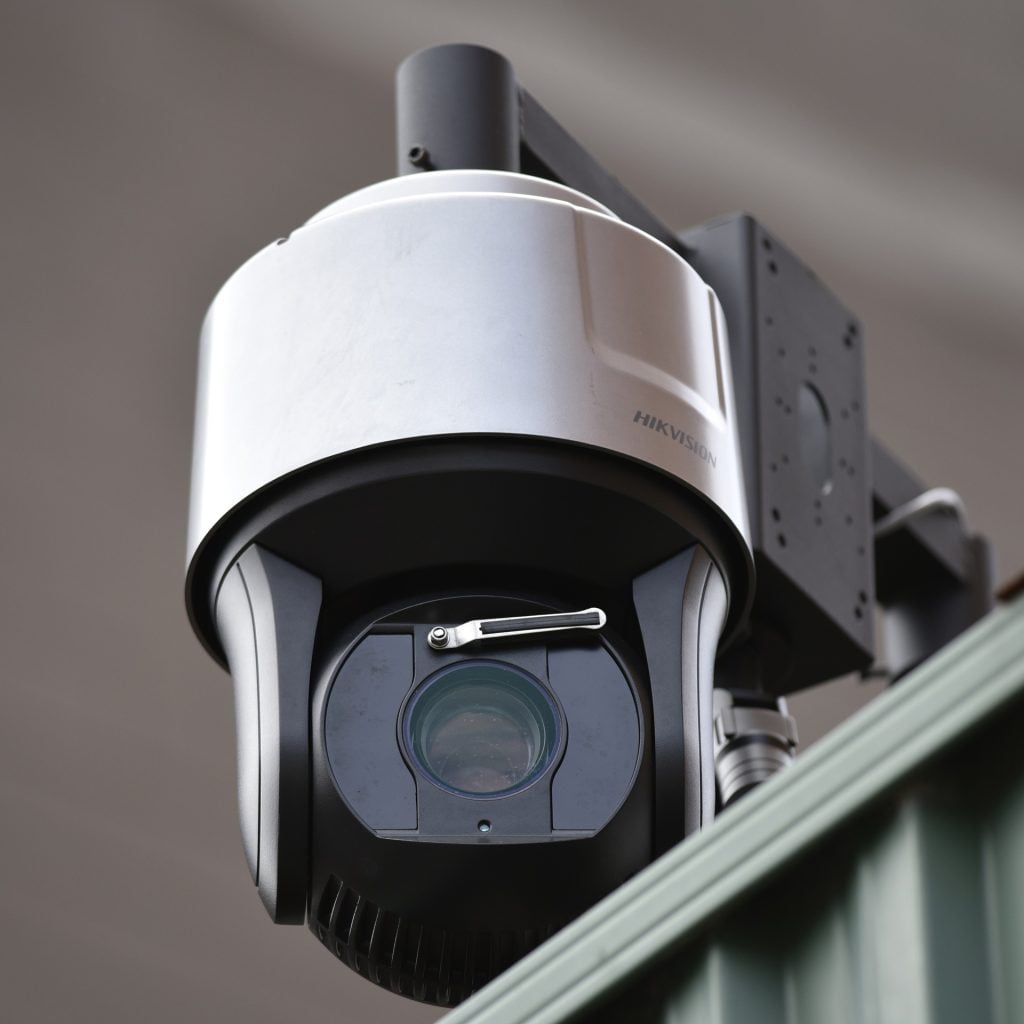
Hikvision Darkfighter X PTZ
Smart Features include smart detection, intrusion detection, line crossing detection, region entrance detection, region exiting detection, face detection, audio exception detection, smart tracking manual tracking, auto tracking, event tracking, smart record ANR (automatic network replenishment), Dual-VCA, ROI encoding of main stream, sub-stream and third stream and support for 8 fixed areas.
Hikvision Darkfighter X PTZ has alarm actions included preset, patrol scan, pattern Scan, memory card video record, trigger recording, notify surveillance centre, upload to FTP/memory card/NAS, send email, etc.
Protocols supported include IPv4/IPv6, HTTP, HTTPS, 802.1x, Qos, FTP, SMTP, UPnP, SNMP, DNS, DDNS, NTP, RTSP, RTCP, RTP, TCP/IP, DHCP, PPPoE and Bonjour. The camera is API open-ended, supports ONVIF and CGI, as well as the Hikvision SDK and 3rd party SDKs. It’s possible to live view on 20 channels with support for 32 users. Security measures from Hikvision Darkfighter X PTZ includes user authentication (ID and PW), host authentication (MAC address); HTTPS encryption; IEEE 802.1x port-based network access control; and IP address filtering.
The Hikvision Darkfighter X PTZ camera has a maximum draw of 68W at 24V AC (full power on IR array), or 50W on Hi-POE. Working temperature is very good for a camera of this type – it’s -40 to 65C. The housing is IP66 rated against weather and dust and IK10 rated against vandalism, discounting the wiper. There’s TVS 6000V Lightning protection, surge protection and voltage transient protection.
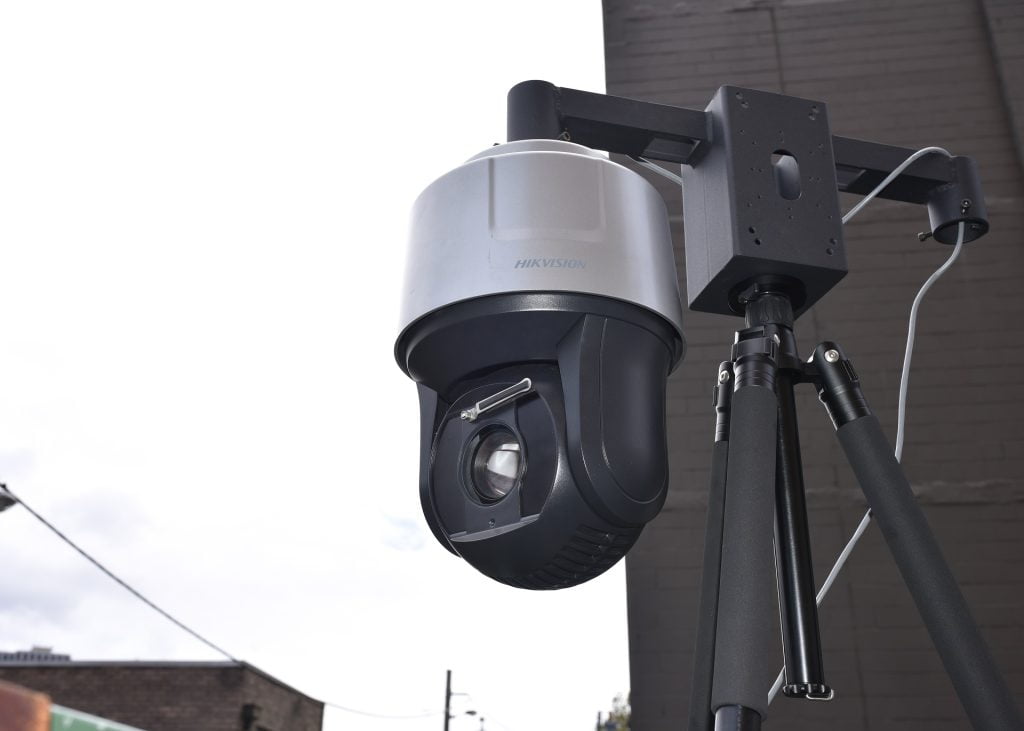
Hikvision Darkfighter X PTZ
Hikvision Darkfighter X PTZ – Darkfighter X is available in 2 form factors a bullet and this PTZ – the camera engines in both are identical and performance should be virtually the same, taking into account any variations in dome bubble or front element. Just what is Darkfighter-X technology?
According to Hikvision, it’s a technology that delivers the best possible colour images in low light by employing techniques similar to those used by human eyes, which employ different groups of cells to collect signals generated by the reflections of colour and brightness from surfaces in the scene which are then merged in the brain to create an enhanced composite image.
In the case of Darkfighter X technology, the camera takes information from an IR sensor (for brightness) and a visible light sensor (colour) and combines them to provide a bright image in full colour without blur or extremes of noise. According to Hikvision, Darkfighter X technology can provide colourful, sharp images down at 0.001 lux – that’s half starlight. There’s obviously some work going on in the processor to manage this so it will be instructive to pay attention to latency and motion blur.
While Hikvision’s specifications describe Darkfighter X has having dual CMOS sensors – one for colour and one for IR, I can’t see the sensors in this enclosed PTZ. It’s hard to imagine how a dual sensor camera engine could be laid out.
Test driving Darkfighter X PTZ
Our test bed is the usual i7-powered Dell Optiplex 9020 with AMD Radeon GPU (8GB). The camera is powered by PoE+ transformer and arrives at the Netgear ProSafe GS108P switch via a second data cable. Monitors used in this assessment are from HP and BENQ. We have a Panasonic dome and a Hikvision turret being tested on the network at the same time.
Bear in mind that this camera is designed to shine brightest in the lowest light and I’m undertaking my first test drive in daylight with considerable backlight – the idea is to get a sense of the optical quality of the camera and to assess the performance of the camera engine in daylight conditions.
Something else to point out is that a southerly change has come through and most the time I’m testing Darkfighter X the wind is gusty between the towers – on the monitor the images rocks back and forth – it’s because of my mounting to the big tripod. I’m reluctant to tighten the grub screws on the tripod too tightly for fear of burring the threads on the pendant mount. What this means is that there was some movement in the camera as I took almost all these snapshots.
Hikvision Darkfighter X PTZ – WDR
My first impressions of the camera during the day in largely default settings (WDR is activated) are relatively low contrast with natural colour tones, excellent sharpness, superb optical quality – there’s limited barrel distortions, no chromatic aberrations, almost no flare or ghosting. This camera delivers an excellent chase of the zoom function by the autofocus – a vital quality for operators working in real time. The angle of view of Darkfighter X is relatively long at the wide end and the reach at the long end is up with the very best.
There’s virtually no noise, there’s almost no discernible digital rebuild artefacts – this is a superior camera engine to anything I’ve seen from Hikvision – we’ve not conducted a full review of a Hikvision camera for more than a year and the improvement in quality is marked. Latency is very low and in good light there’s no evidence of stepping or motion blur. Viewing district scenes at longer zoom lengths highlights the optical excellence of Darkfighter X – there are no CAs along foreground powerlines.
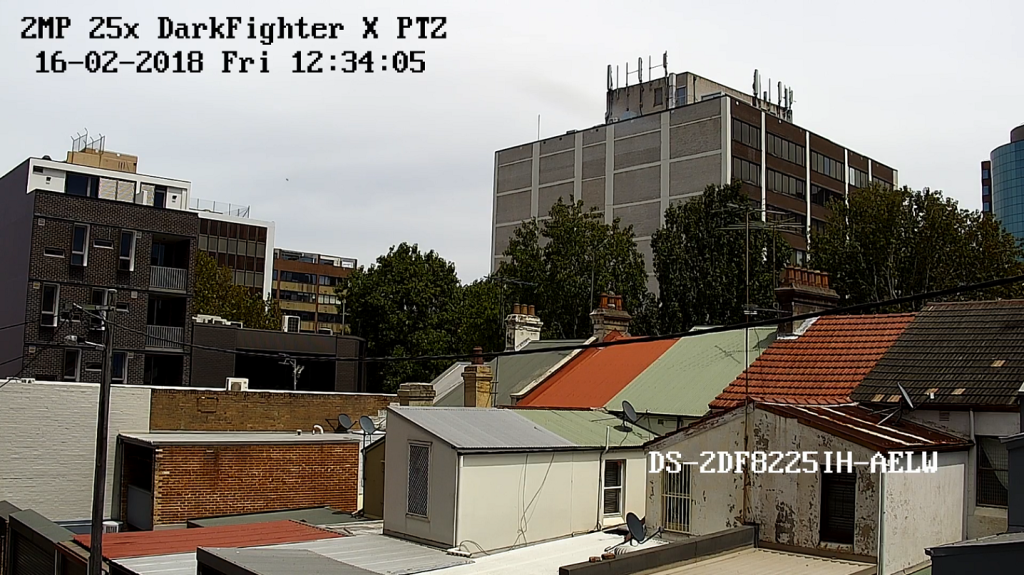
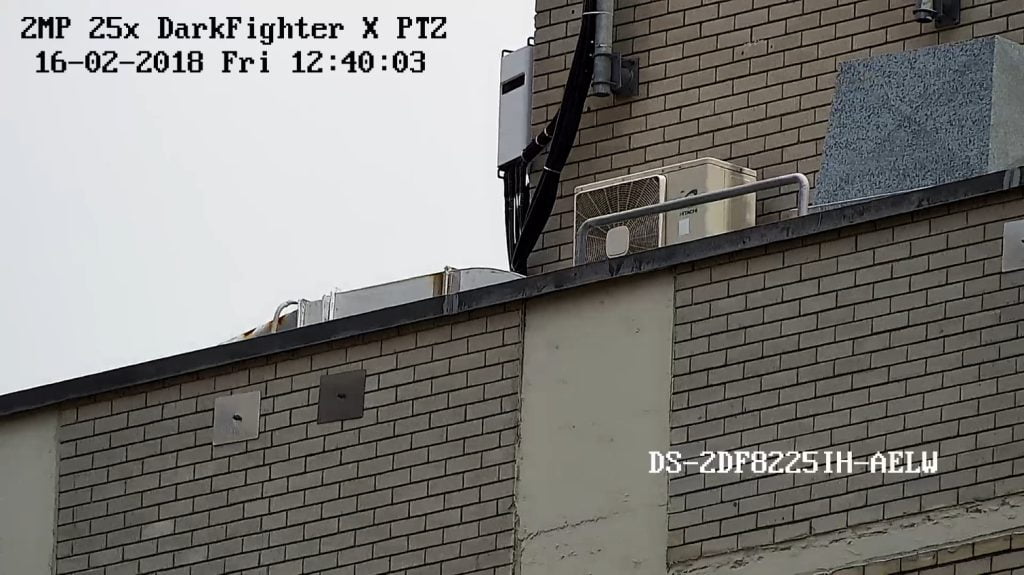
At Security 2017 in Sydney Hikvision pointed out that every single tile in the colour pallet of its Darkfighter X demo was well defined and distinctly different in tone from its neighbours. When I reported on that demo last year, I noted that the older Darkfighter technology seemed to be making generalisations of colour which robbed scenes of detail in the real world.
Pointing Darkfighter X over the district scene those observations were brought home. Colour tones are very natural and there’s none of the exaggerated saturation you sometimes see. The subtle colour variations in the chimney pots are almost exactly as they appear to the naked eye.
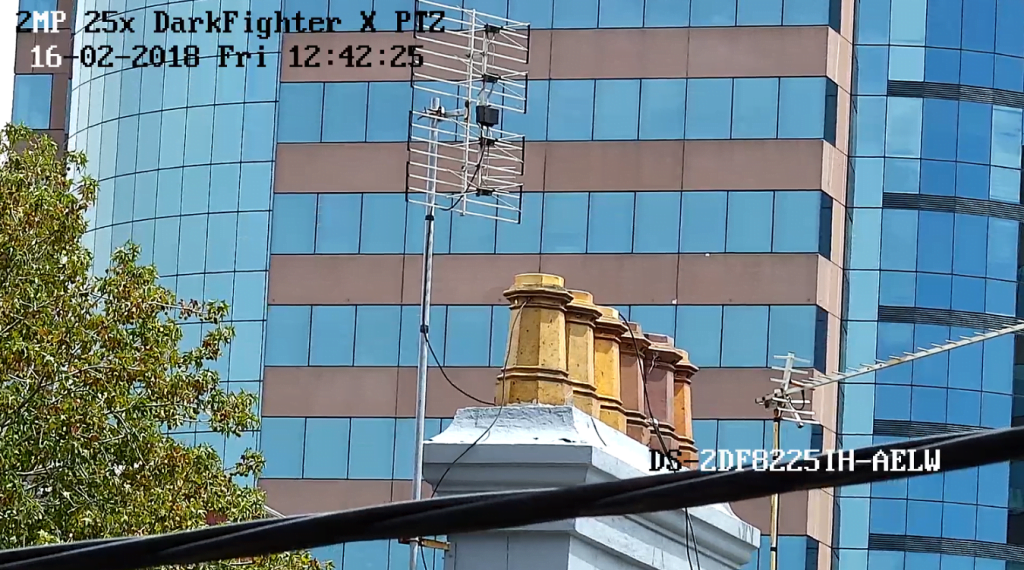
I find the performance to be equally strong zoomed into tight street scenes. The level of detail is high from edge to edge and there’s very little motion blur. In one alley scene as I snare a snapshot of a pedestrian walking down the lane, a ball of paper tumbles by in mid-air – I can see the shadow underneath it. Wide scenes on this quite glarey overcast day can see colours a little muted as the processing engine keeps highlights under control.
When you zoom into areas with consistent brightness, the image becomes lighter, even though aperture is closing down toward F3.5.
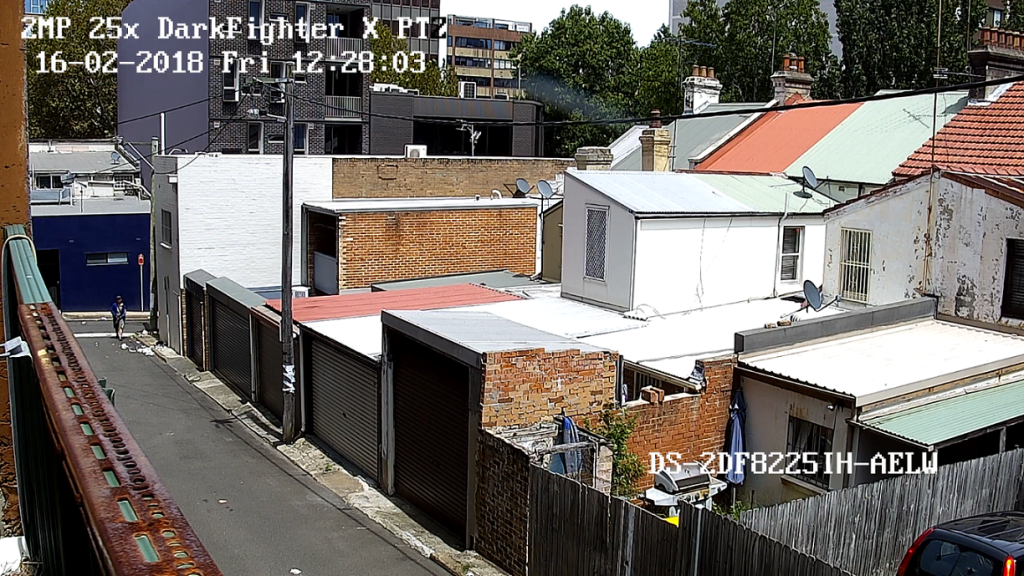
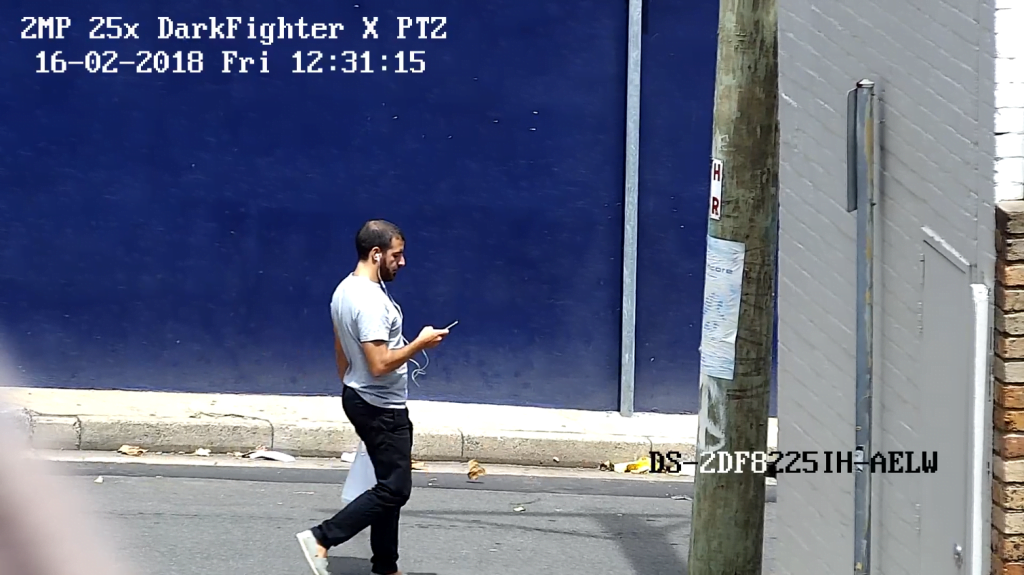
Zoom is a real strength during the day and later I find it’s excellent at night, too. I spend a deal of time zooming in on key buildings throughout my scene – the World Tower first, then a high rise down the hill. The imagery I get from these views is extremely good, with excellent levels of detail suggesting strong sharpness.
Hikvision Darkfighter X PTZ
I said earlier the Hikvision Darkfighter X PTZ camera is low contrast and while I think this is so, there’s a lot of subtle contrast in the images. I try for Sydney Tower but in this application but it’s under the horizon viewed from my lower than usual tripod mounting point.
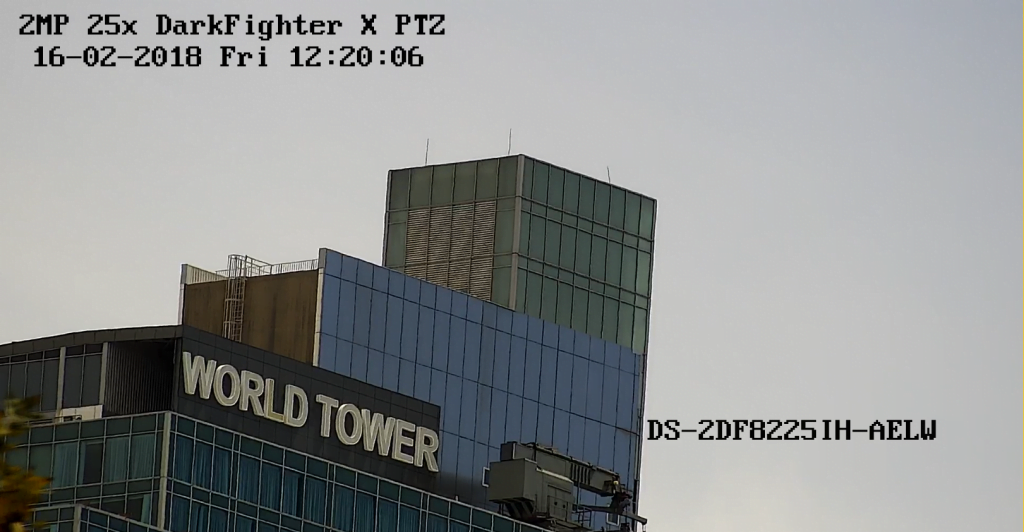
Viewing scenes with variable lighting under zoom highlights the camera’s capability. It does well at finding a balance between bright and dark when both conditions are present in significant areas of a scene. WDR performance is excellent, too. Even in the presence of very strong backlight I’m able to get good detail. Bright points are rendered as stars and I find the camera deals with reflections very well – I can see through car windscreens and view occupants.
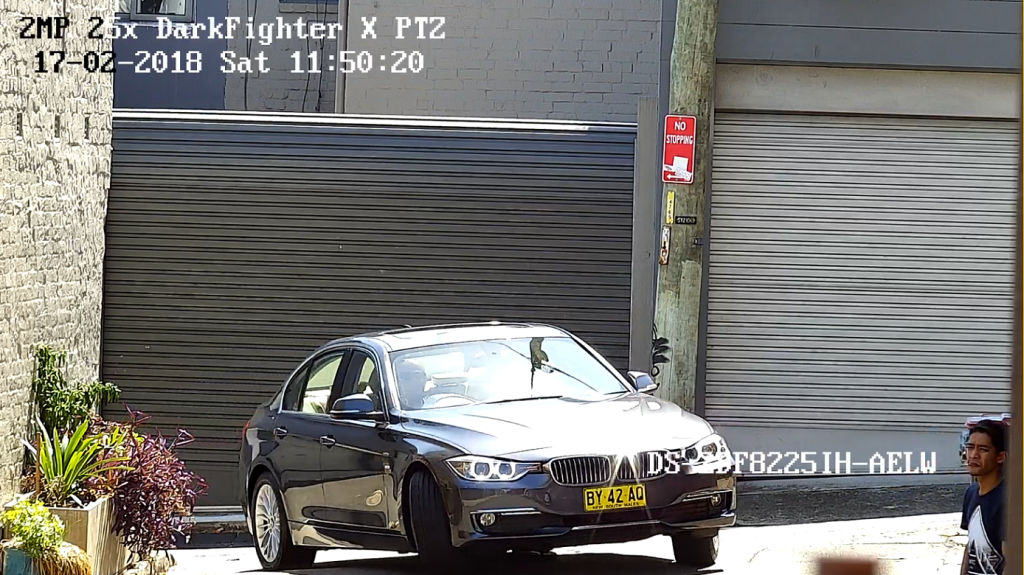
A great quality of Hikvision Darkfighter X PTZ cameras is their ability to maximise their resolution at the long end. As the angle of view gets under 10 degrees the concentration of pixels amplifies detail. Compression is also enhanced, which is ideal for narrow, long spaces.
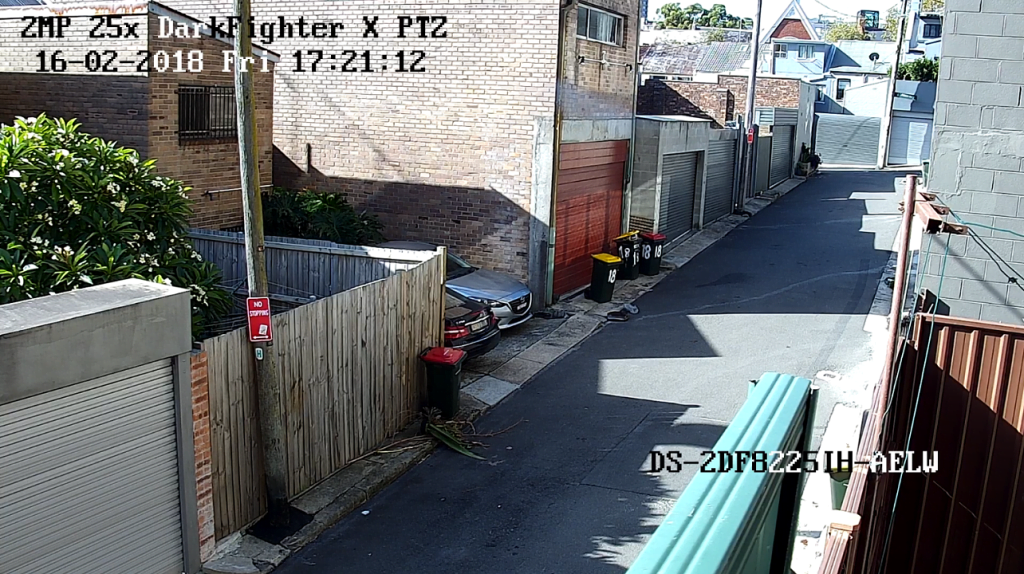
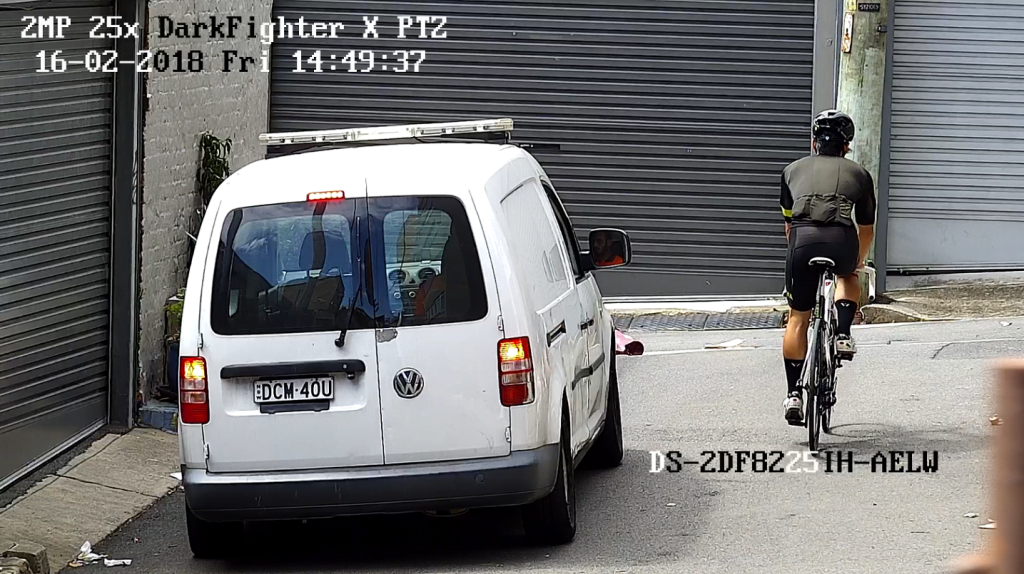
A key characteristic – motion blur – is very well controlled in good light. The camera handles moving objects heading towards or away from it better than it does those moving at right angles, but performance of the latter is still solid. I easily get plates coming up and down the lane at speeds up to 25kmph, pedestrians moving around, joggers – all show no signs of blurring and this performance continues as light fades. WDR performance is strong, too.
As the afternoon heads into evening, colour tones start to warm but the colour image stays strong and sharp until around 8pm when it begins to yield up some processing noise. This slight noise doesn’t increase over a 30-minute period into full dark – that’s sub-2 lux at the lens. I find I can still get moving faces in colour at night, too.
Hikvision Darkfighter X PTZ Low light Performance
Driving Hikvision Darkfighter X PTZ in colour at night out over the back lane is an unusual experience. The camera manages amplification so well, contriving to make dark scenes bright and colourful, that I go out the back and climb on my step ladder to check if there’s a white light array. Part of the reason I do this is because of the way the camera looks on screen as I move around the dark scene.
When I shift to a new angle of view the image brightens intensely in a way that is not always uniform, before settling to an even colour, almost as if a lamp has been activated and its output is being adjusted in software to get the best performance. Something else I notice while all this is going on, autofocus handles the dark conditions surprisingly well.
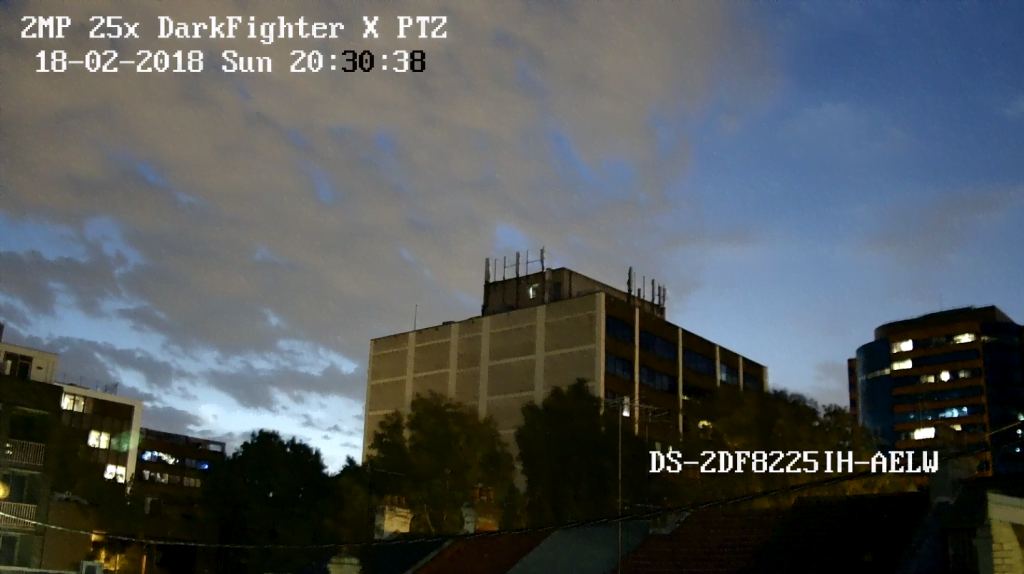
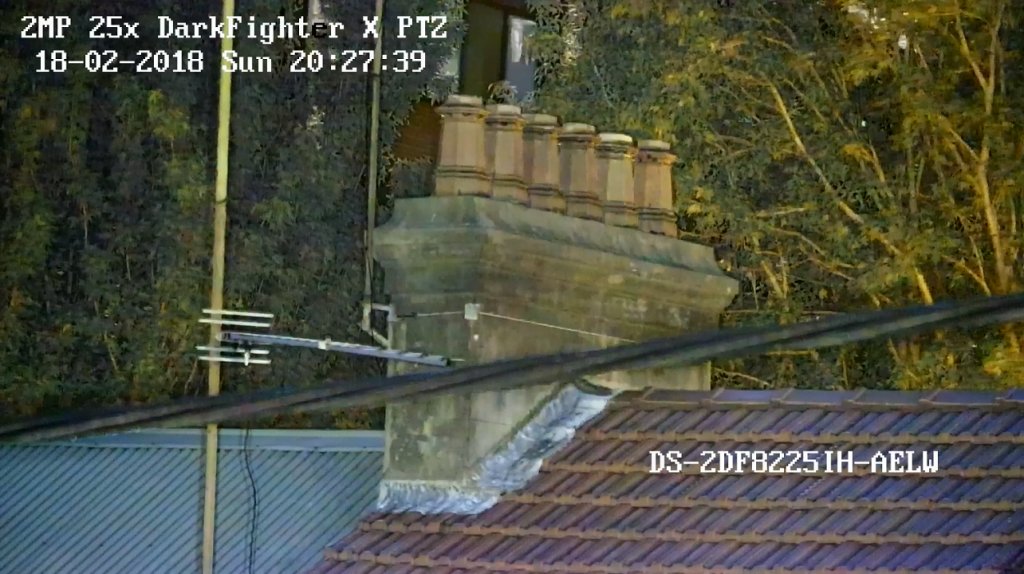

Hikvision Darkfighter X PTZ Night Performance in Colour
I find myself shaking my head over Darkfighter X’s night performance in colour. The sky is blue, the trees are green, the tiles are red. No, it’s not an image devoid of noise or latency – the camera is working hard to build this image stream – but it’s impressive nonetheless. I go outside multiple times just to be sure it really is full dark. That colour image of chimney pots 40 metres from the lens you see here – I could not see those chimney pots at all. And Darkfighter X sees past the chimney pots to the mortar lines in the building behind. Outstanding.
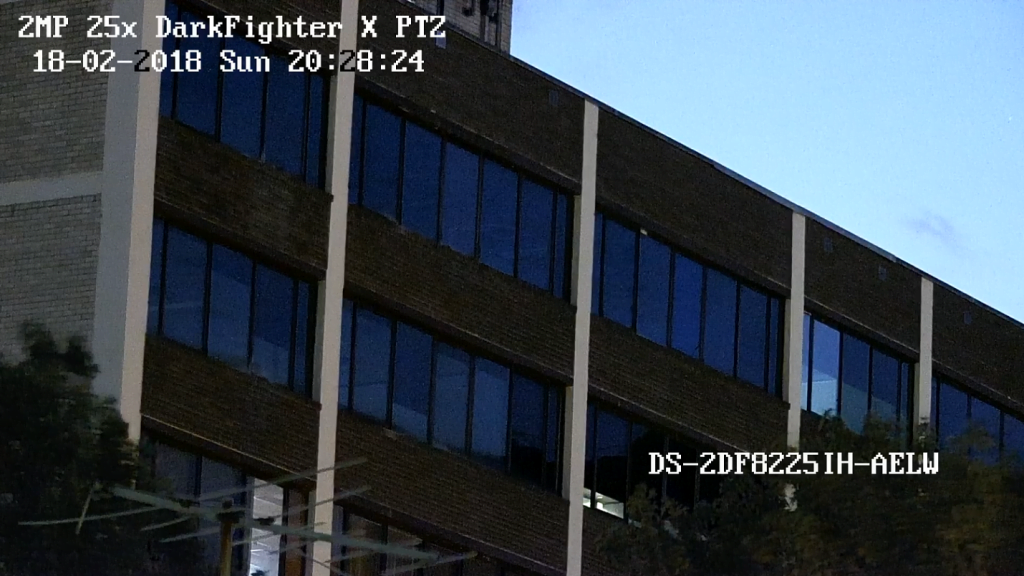
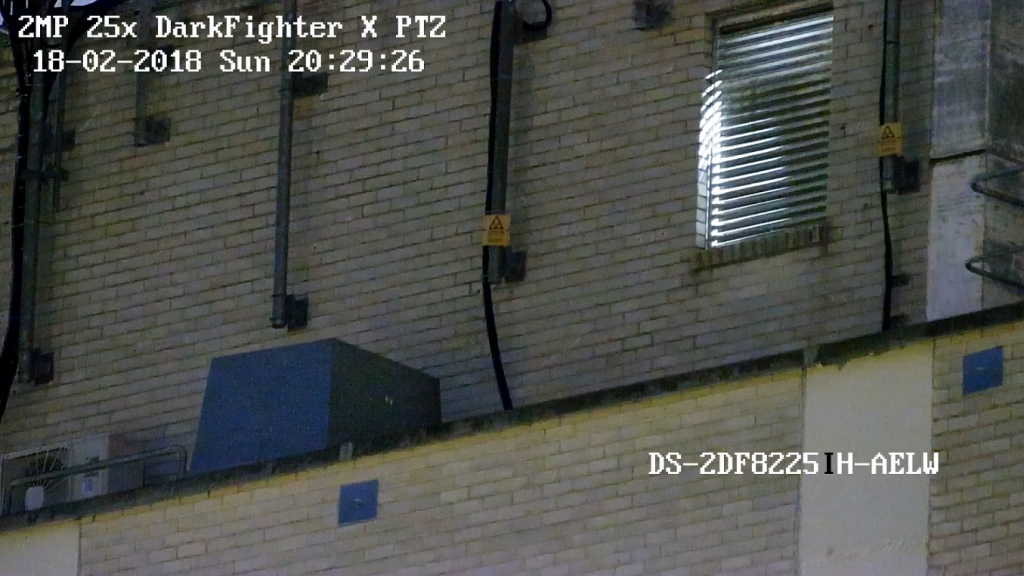
When I aim the camera at that building at 150m, after a brief period of latency, maybe 350th of a second, the image intensifies into layers of colour, reflections from windows and blue sky. When I zoom in on the top of a building at about 100m I get very strong detail in colour. There’s some processing noise but it’s impressive unassisted performance from The Hikvision Darkfighter X PTZ.
After I take this shot I pull back and get the wide view – there’s blue sky and clouds. I go out and check the horizon again and it’s dark. While I’m in colour, I swing the camera around to get a look at World Tower at 1000m on full zoom. It’s another strong image with some colour and excellent management of blooming from the sensor.
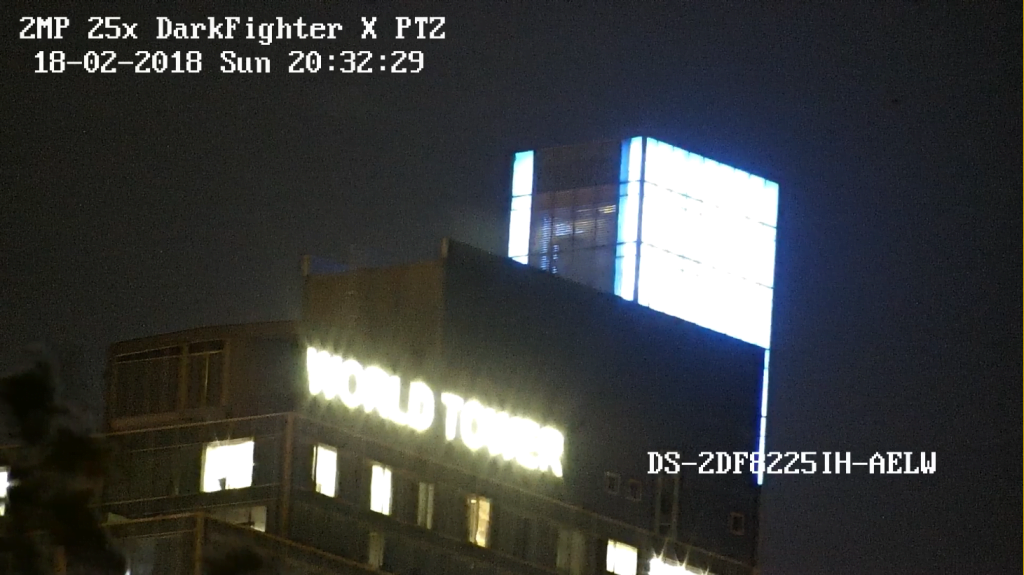
Before I switch over to night mode, I grab an image of the frangipani blossoms across the lane in colour and note I have face recognition of a neighbour outside their garage. Next, I zoom the camera into the end of the lane – about 70m from the lens and force it into night mode.
Hikvision Darkfighter X PTZ The IR Performance
Immediately, the IR array fires up, shifting from strong to intense, then backing off a touch as the camera adjusts to the focal length. This IR array is powerful. I can’t help feeling I must be blinding pedestrians and drivers with it but when I check the fascia of the camera there’s just the usual soft red glow from the array.

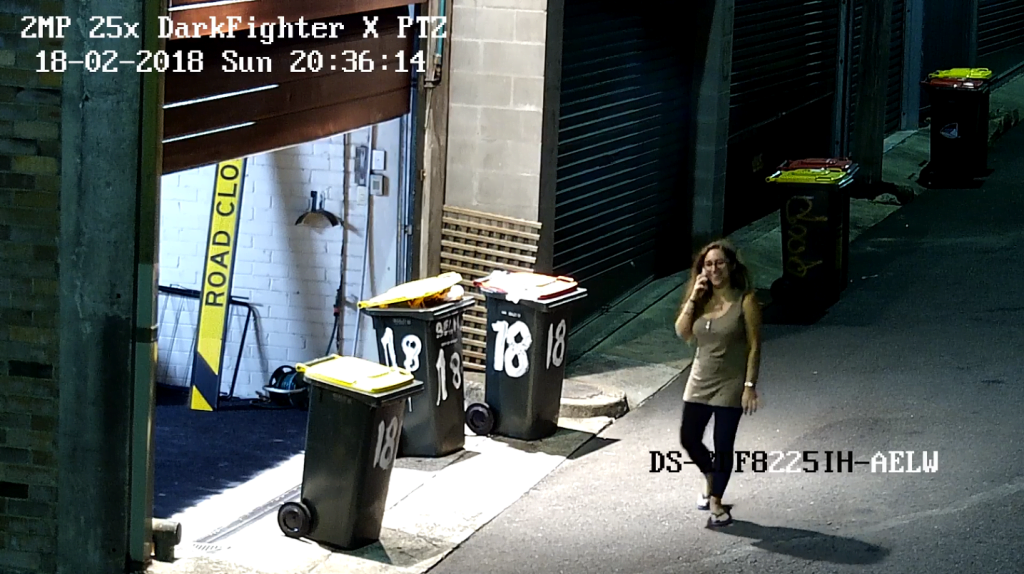
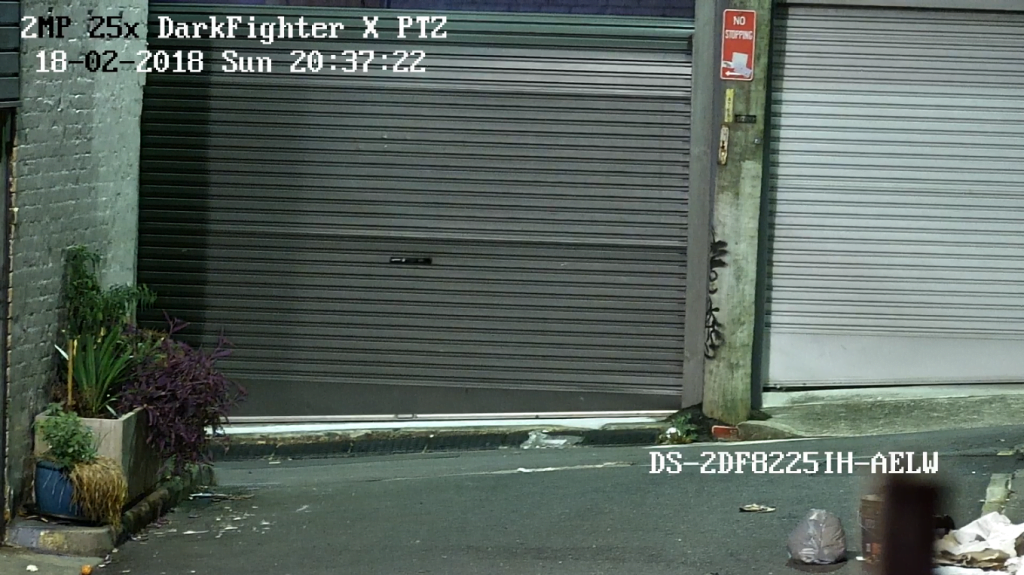
A vehicle parks at the end of the lane and I have strong detail with excellent contrast. A couple of pedestrians come up the lane – they are walking away from me but I get excellent detail of tattoos and clothing. There is some processing shimmer but there’s not the tell-tale dragging blur of a bottomed-out shutter speed.
At closer ranges the IR performance eases off – there’s still loads of detail, the same processing shimmer but with typical movements I have excellent face recognition and good control of IR flare, which gets better away from the centre of the image.
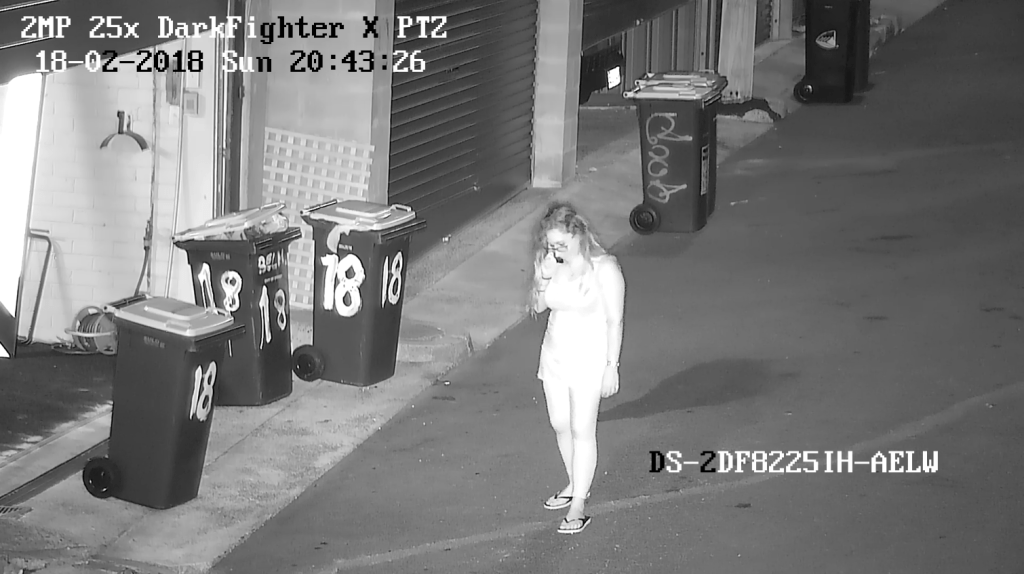
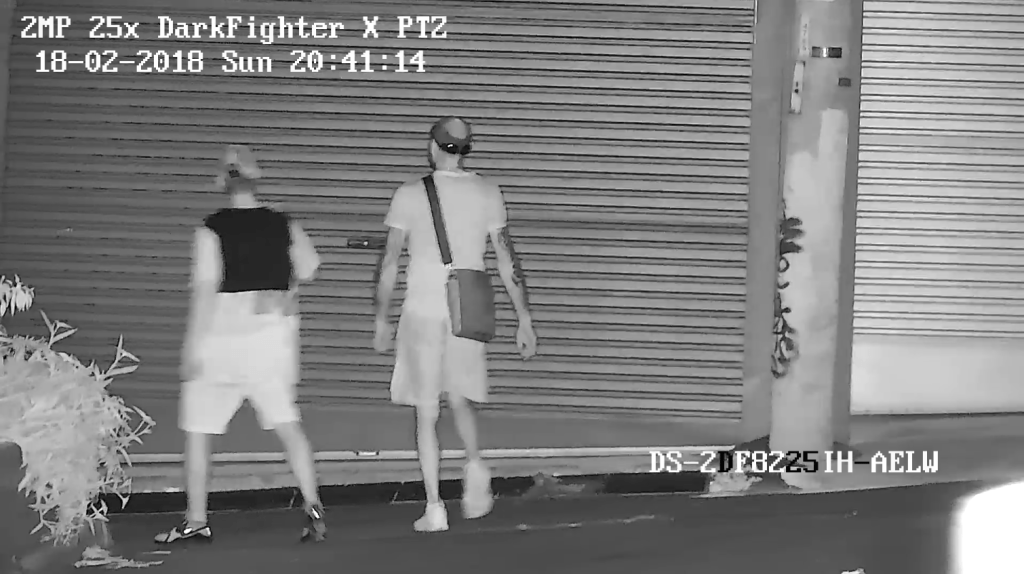
As Hikvision explains things when it comes to monochrome night performance, Darkfighter X fires up its second IR sensor supported by Smart IR functionality. How good is it? Certainly, the low light performance in colour was already very good, particularly at the long end. In night mode, the Smart IR function combined with the new dual sensor design is something else again. Images tell the story best.
I snap a shot of the chimney pots at 40m with light at the lens sub-1 lux. The image is sharp, the contrast is flinty and there’s loads of detail thanks to the ability to discern variations in tone. Whenever I zoom in, detail increases with no sign of amplification noise.
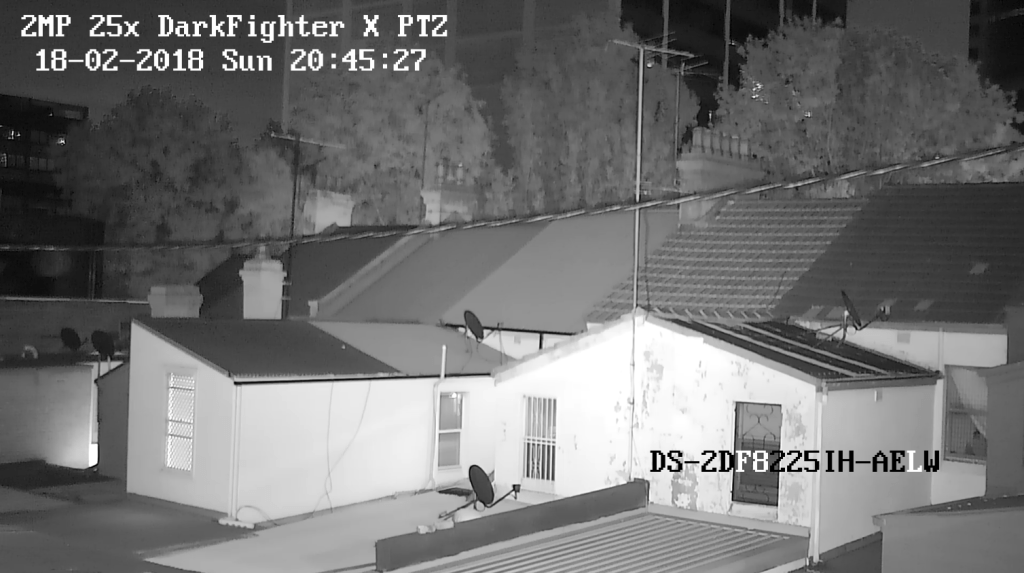
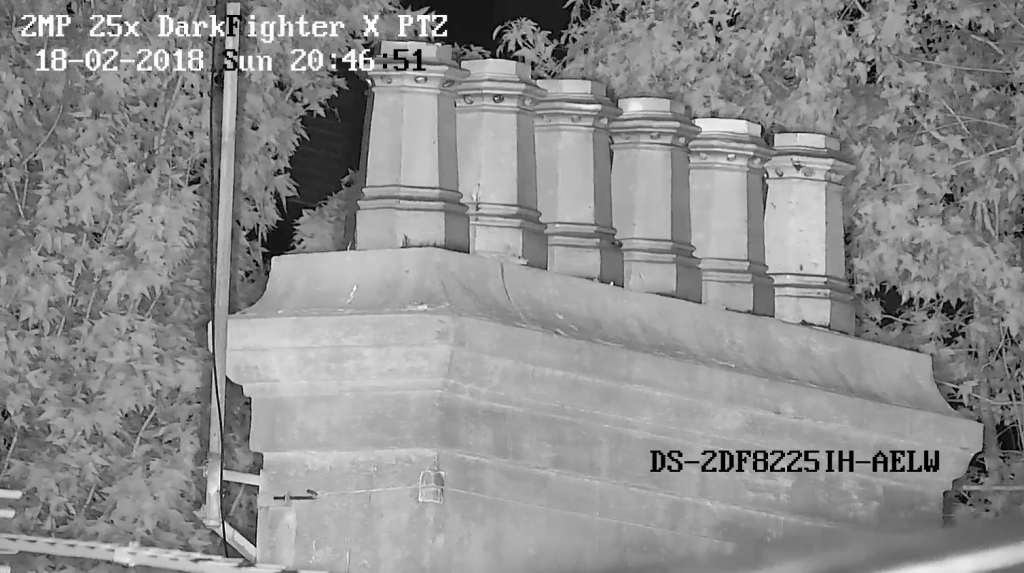
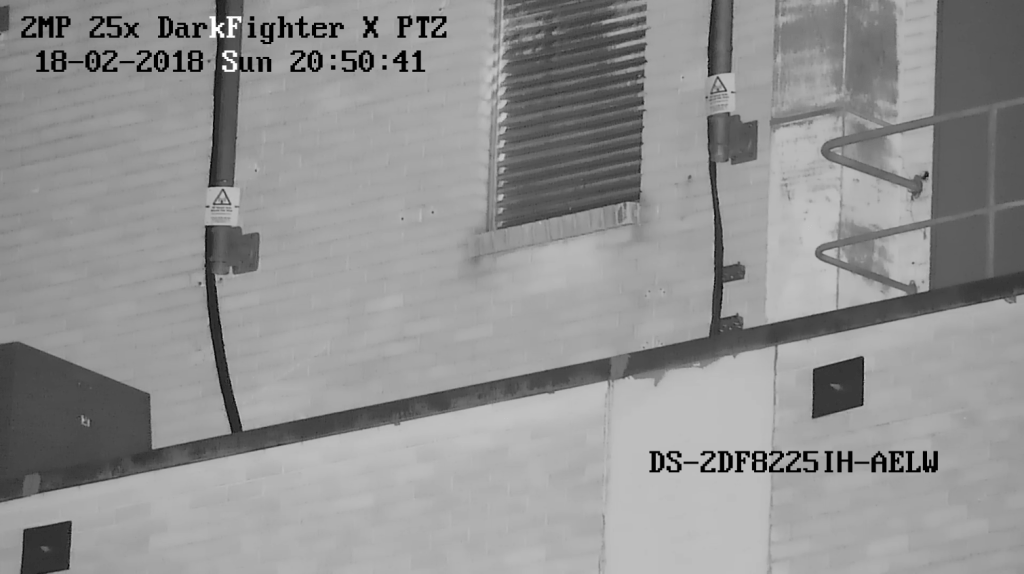
Next, I take a look at the top of the building at about 100m and again, the detail is outstanding. I spin the camera towards a block of flats down the hill and the IR performance is very strong – this image really highlights the contrast capabilities of Darkfighter X.
To finish up the night mode test I wait for a pedestrian to walk down the lane but instead I get a car doing about 25kmph at right angles to the lens. The quality of the snapshot is strong again – there’s some blur but this is a very difficult shot.
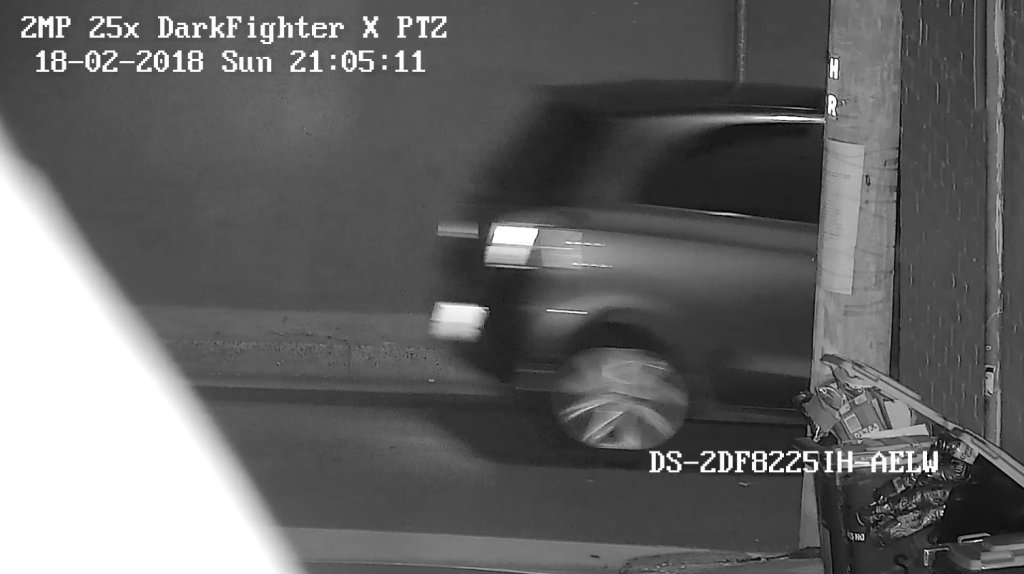
Conclusion
The Hikvision Darkfighter X PTZ is a fine surveillance camera with excellent build quality and a solid specification. Optically, it’s excellent, showing almost none of the usual aberrations or distortions. There’s almost no flare or ghosting – I notice one very predictable soft rectangle mid-centre of the lens when looking into direct sunlight.
WDR capability is excellent, too, and colour rendition is solid, though I found myself preferring the long end in 80,000 lux and I put this down to the WDR function darkening less bright areas of the image to avoid over exposing bright parts in wider views. This is a characteristic I have noticed before with Hikvision cameras. Reduction in aperture probably plays a part, too. At all times, pan, tilt, zoom and most importantly, auto focus, are very well executed.
Hikvision Darkfighter X PTZ
The Hikvision Darkfighter X PTZ camera engine delivers colour images in sub-2 lux at the wide end of the lens at F1.5 as well as at the long end, when aperture is closed down to F3.5. It achieves this with some latency and noise in areas of complete darkness. When testing this camera, I found a strong dislocation between what was on the monitor and what was going on in front of the lens. Colour performance in sub 2 lux and night mode with IR activated are the camera’s fortes. IR is powerful but well controlled and the camera can to dig deep into dark scenes with a minimum of IR flare and motion blur.
You can read more about Hikvision cameras here and see more SEN news here.
Features of The Hikvision Darkfighter X PTZ include:
* Colour: 0.001lux/F1.5, B/W: 0.0001lux/F1.5
* Dual optical and IR sensors 1/2.8″ CMOS
* 25x varifocal zoom lens
* 2MP, 1080p resolution
* IP66 rated bullet and PTZ
* 200m infrared
* 120dB wide dynamic range
* Optical zoom:25x, focus:4.8-120mm
* Supports SD/SDXC card up to 128GB
* Optical de-fog
* Smart detection functions
* H.265+/H.265/H.264+/H.264/MJPEG
“Hikvision Darkfighter X PTZ is a powerful IP66-rated PTZ camera designed specifically for strength in low light applications.”




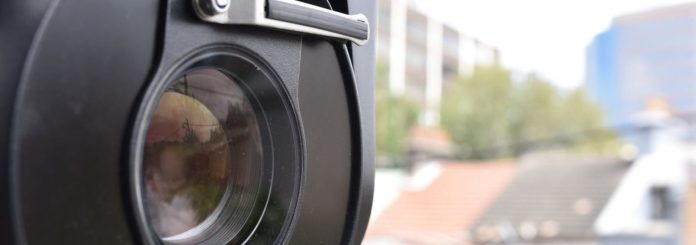





Excellent review! The detailed analysis of the Hikvision Darkfighter X PTZ’s low-light performance and advanced features is really impressive. It’s great to know how well it performs in challenging lighting conditions. Thanks for sharing this in-depth review!
Cheers for that input!